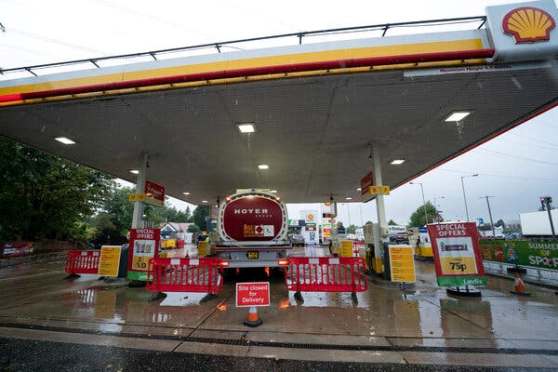By Jenny Gross
LONDON — Drivers in Britain have been rushing to gas stations to fill up, amid a fuel shortage that has lasted days. Long lines at gas stations and rising fuel prices are the latest challenges that the country faces as it emerges from the pandemic.
Here’s a look at what’s been happening.
Is this the 1970s all over again? Why is there a gas shortage?
Across London and other parts of Britain, gas stations (called ‘petrol stations’ here) have run out of fuel.
The shortages have drawn comparisons to the global energy crises of the 1970s, when an OPEC oil embargo led to widespread shortages. But unlike then, the current shortage is not one of fuel but of trained drivers to deliver it.
Truck drivers tend to be older, and they are retiring. At the same time, driver trainees are facing delays in getting licensed because of the pandemic. Transport companies have reported raising wages for truck drivers by 25% or more this year to retain them.
The shortage has also caused problems for restaurants, which are struggling to obtain food, and grocery stores, which have been unable to replenish shelves.
Drivers, concerned about reports of empty gas stations, have also been panic buying fuel in recent days, which has exacerbated the shortages.
Brexit is a contributing factor, but not the only problem
Britain’s withdrawal from the European Union has made labor shortages worse, but it is not the sole cause. The Road Haulage Association, a trade association of road transport operators, estimates that Britain is facing a shortfall of 100,000 drivers. About 20% of those are drivers who left Britain after it voted to leave the European Union.
In an effort to attract drivers, the government has increased the number of hours they can work each day and has sped up the licensing process. It has also offered 5,000 three-month work visas to foreign truckers and to suspend rules that prevent oil companies from coordinating deliveries.
But some government critics say that may not be enough to address the long-running shortage of drivers. About 200,000 EU citizens left Britain during the pandemic, on top of the thousands who have left since 2016, when Britain voted in a referendum to leave the European Union and signalled it would impose limits on immigration from the bloc. That has made it harder for companies — including those in the haulage, hospitality and food supply sectors — to fill empty positions with overseas hires.
The military is on standby in case the situation worsens
The government has urged calm and said there were tentative signs that the situation was beginning to stabilize. Officials are hoping that normal purchasing patterns will resume now that many Britons have rushed to fill up their tanks over the past few days, alleviating the pressure on supplies.
But if the fuel crisis worsens, the government has put 150 military tanker drivers on standby.
Taxi drivers, food suppliers and others whose livelihoods depend on driving said they were still concerned. The teachers’ union said in a statement Tuesday that the fuel shortages had caused serious difficulties for educators and urged the government to prioritize teachers’ access to gas.
The Petrol Retailers Association, which represents independent fuel retailers in Britain, said in a statement Tuesday that there were early signs the crisis was abating, but that deliveries were still reduced.
“I’m afraid to say there is still quite a bit of panic buying around the country,” Brian Madderson, chair of the Petrol Retailers Association, told the BBC.
“As soon as a tanker arrives at a filling station, people on social media are advising that a tanker has arrived, and then it’s like bees to a honey pot. Everyone flocks there,” Madderson said. “Within a few hours it is out again.”
-New York Times


